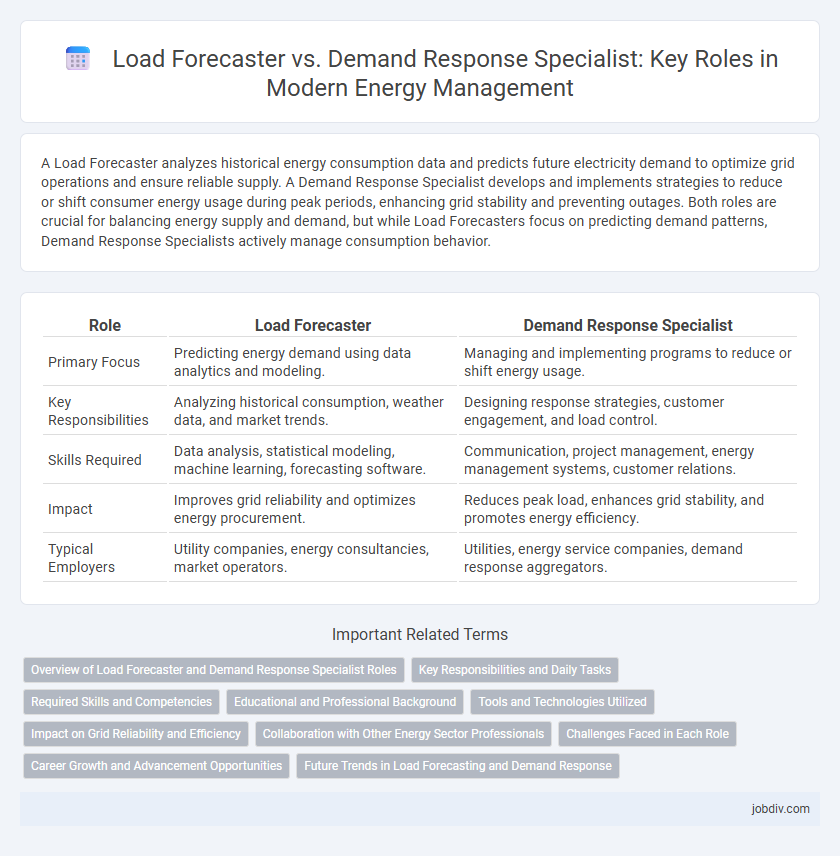A Load Forecaster analyzes historical energy consumption data and predicts future electricity demand to optimize grid operations and ensure reliable supply. A Demand Response Specialist develops and implements strategies to reduce or shift consumer energy usage during peak periods, enhancing grid stability and preventing outages. Both roles are crucial for balancing energy supply and demand, but while Load Forecasters focus on predicting demand patterns, Demand Response Specialists actively manage consumption behavior.
Table of Comparison
| Role | Load Forecaster | Demand Response Specialist |
|---|---|---|
| Primary Focus | Predicting energy demand using data analytics and modeling. | Managing and implementing programs to reduce or shift energy usage. |
| Key Responsibilities | Analyzing historical consumption, weather data, and market trends. | Designing response strategies, customer engagement, and load control. |
| Skills Required | Data analysis, statistical modeling, machine learning, forecasting software. | Communication, project management, energy management systems, customer relations. |
| Impact | Improves grid reliability and optimizes energy procurement. | Reduces peak load, enhances grid stability, and promotes energy efficiency. |
| Typical Employers | Utility companies, energy consultancies, market operators. | Utilities, energy service companies, demand response aggregators. |
Overview of Load Forecaster and Demand Response Specialist Roles
Load Forecasters analyze historical energy consumption data and use advanced statistical models to predict future electricity demand, enabling utilities to balance supply and demand efficiently. Demand Response Specialists design and implement programs that incentivize consumers to reduce or shift energy usage during peak periods, optimizing grid stability and reducing operational costs. Both roles are crucial in modern energy management, integrating data analytics and consumer behavior insights to enhance grid reliability and sustainability.
Key Responsibilities and Daily Tasks
Load Forecasters analyze historical energy consumption data and weather patterns to predict short-term and long-term electricity demand, enabling efficient grid management and generation scheduling. Demand Response Specialists develop and implement programs that incentivize consumers to reduce or shift their electricity usage during peak demand periods, helping maintain grid stability and prevent outages. Both roles require close collaboration with utilities, data analysis, and real-time monitoring of energy systems to optimize grid performance.
Required Skills and Competencies
Load Forecasters require strong analytical skills, proficiency in statistical modeling, and expertise in forecasting software to predict future energy consumption accurately. Demand Response Specialists need excellent communication abilities, knowledge of real-time grid operations, and experience with customer engagement and incentive programs to manage energy use effectively during peak periods. Both roles demand familiarity with energy market regulations and data analysis but emphasize different aspects of the energy management lifecycle.
Educational and Professional Background
Load Forecasters typically hold degrees in electrical engineering, data science, or applied mathematics, complemented by expertise in statistical modeling and energy market analytics. Demand Response Specialists often have backgrounds in environmental science, business administration, or energy management, with professional experience in policy implementation, customer engagement, and grid reliability strategies. Both roles require strong analytical skills, but Load Forecasters emphasize predictive algorithms, while Demand Response Specialists focus on behavioral and regulatory frameworks.
Tools and Technologies Utilized
Load forecasters rely heavily on advanced statistical software, machine learning algorithms, and big data analytics platforms like Python, R, and Hadoop to predict energy demand with high accuracy. Demand response specialists utilize real-time energy management systems, smart grid technology, IoT sensors, and automated control platforms to dynamically adjust and optimize energy consumption. Both roles increasingly integrate AI-powered tools and cloud-based solutions to analyze consumption patterns and enhance grid reliability.
Impact on Grid Reliability and Efficiency
Load Forecasters analyze historical and real-time data to predict electricity demand, enabling grid operators to balance supply and prevent outages through precise scheduling of generation resources. Demand Response Specialists design and implement programs that incentivize consumers to reduce or shift their electricity usage during peak periods, thereby alleviating stress on the grid and enhancing overall system efficiency. Together, these roles optimize grid reliability by ensuring stable supply-demand equilibrium and minimizing the risk of blackouts or overgeneration.
Collaboration with Other Energy Sector Professionals
Load Forecasters analyze consumption patterns and forecast electricity demand, providing crucial data for Demand Response Specialists who design programs to modulate energy usage during peak times. Their collaboration ensures accurate prediction models align with actionable demand response strategies, enhancing grid reliability and efficiency. Integration with grid operators, market analysts, and renewable energy planners further optimizes energy distribution and reduces operational costs.
Challenges Faced in Each Role
Load Forecasters face challenges in accurately predicting energy consumption patterns influenced by variables such as weather fluctuations, economic factors, and unexpected events that cause demand volatility. Demand Response Specialists encounter difficulties in coordinating with consumers to modify usage behavior during peak periods, addressing technological integration issues, and ensuring compliance with regulatory requirements. Both roles require advanced analytics and adaptive strategies to manage grid reliability and optimize energy distribution effectively.
Career Growth and Advancement Opportunities
Load Forecasters leverage advanced data analytics and machine learning to predict energy demand, positioning themselves for roles in data science and grid management with high career growth potential. Demand Response Specialists focus on real-time energy consumption optimization and customer engagement, providing pathways to leadership roles in utility regulation and sustainable energy solutions. Both careers offer upward mobility, with Load Forecasters trending towards technical expertise and Demand Response Specialists advancing through strategic program management.
Future Trends in Load Forecasting and Demand Response
Advancements in artificial intelligence and machine learning are transforming load forecasting accuracy, enabling load forecasters to predict energy consumption patterns with greater precision and shorter lead times. Demand response specialists are leveraging real-time data analytics and smart grid technologies to optimize energy usage, integrate distributed energy resources, and enhance grid flexibility. Future trends emphasize the convergence of predictive analytics and automated demand response systems to support sustainable energy management and dynamic grid balancing.
Load Forecaster vs Demand Response Specialist Infographic

 jobdiv.com
jobdiv.com